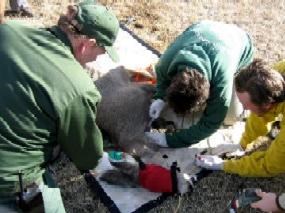
NPS Photo
Date January 16, 2004 Contact Tom Farrell, 605-745-1130 As part of a three-year study of Wind Cave National Park’s deer herd, twenty-four deer were captured Wednesday, January 14, and tested for Chronic Wasting Disease (CWD). Afterwards, twenty were fitted with GPS collars and four with radio collars. The GPS collars will record the deer’s location every 6 hours for the next 14 months. Both types of collars will allow the animal to be relocated and euthanized should the CWD test return as positive. The study is being conducted by a PhD. student from the South Dakota State University (SDSU) in Brookings and is a collaboration with South Dakota Game Fish and Parks. This is the study’s second year; it began last winter with the testing and collaring of forty deer. The study’s purpose is to determine the park’s deer population, density levels, movement patterns, and CWD prevalence rate. A tonsillar biopsy was conducted on each deer, and the tissue samples sent to the Colorado State University Diagnostic Lab in Fort Collins for analysis. Results from this round of CWD testing should be available within a few weeks. Resource Management Specialist Dan Roddy said, “We were very pleased with the success of the capture operation. The cooperation between SDSU, Game Fish and Parks, and the National Park Service made this operation and the study possible. The information learned will allow us to better assess and manage deer within the park. ” Since 1998, forty-eight deer and seven elk in the park have been tested for CWD. Of those totals, four deer and one elk have tested positive for this disease which is similar to mad cow disease and thought to be caused by a “prion” or abnormal protein particle. Clinical symptoms of this fatal disease include loss of body condition and weight, excessive salivation, ataxia, and behavioral changes. How the disease is transmitted is unknown, although at this time there is no evidence CWD can be transmitted to humans. |
Last updated: July 31, 2017
